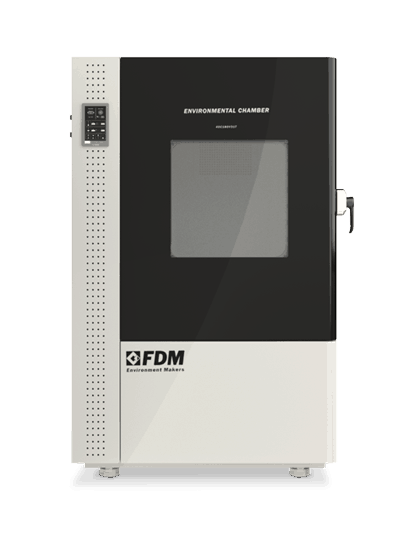
Asphalt and Concrete
Asphalt is, in Italy, the most used material for road paving.
Concrete is instead more widespread, in this specific field, outside our borders. The reason? Its conglomerate, being bound by cement, tends to be more resistant over time.
We have already dealt, as regards concrete:
Perform
Climate Stress
Discover the new series of Climate Chambers for controlled climate testing
The advantages of both materials are in fact in relation to both the short and long term. Asphalt is cheaper, but requires more maintenance. Concrete is in the purchasing process more expensive, but most likely involves fewer long-term interventions.
The choice of one or the other therefore depends on several factors, such as:
- the climate of the place
- the type of road or pavement to be built
- the economic investment to be incurred
Bituminous Conglomerates
Asphalt is a common way to define what are technically called bituminous conglomerates.
A bituminous conglomerate is a mixture of aggregates (both natural and artificial) held together by a component, called binder. The latter is called bitumen, and is the result of refining crude oil. Bitumen compacts the mixture and keeps it compact and resistant over time. Polymers are also added to the mixture, intervening in the chemical balance of the materials involved and strengthening the compound.
Product Testing on Building Materials
All building materials require rigid tests, both to meet the laws from the regulatory bodies and to confirm the specifications defined by the manufacturer: whether these are mandatory, in order to define a product as such, or optional, that means that they are chosen by the manufacturer himself.
This is the right procedure for each product on the market: there are essential conditions of characteristics and safety to comply with, so that, for example, a toy can be sold, and then the other original features of each toy, that the manufacturer must be able to confirm legally.
In the case of our conglomerates, the performative issue of the mixture is important in the same way as the regulatory issue.
Before marketing, each finished bitumen mixture must come with a European CE marking. Manufacturers must, before sending the conglomerate out of the factory, be able to draw up a document containing all the steps up to the production of the asphalt, together with the parameters and procedures that affect the development of the good. The summary of these steps is called FPC, Factory Production Control.
The reference standard for the CE marking of bituminous conglomerates is the UNI EN-13108
The tests must be carried out both during the manufacturing of the material, and after the marketing, to evaluate its strength and durability.
Also with regard to asphalt, for example, some situations may occur, after leaving the factory, which we can divide between natural and artificial:
Among the natural ones, we can mention:
- accumulation of water
- temperature Changes
Among the artificial ones, instead:
- compaction issues
- non-homogeneous material and/or thickness and/or subsoil
- road traffic
All these factors can lead to what is called fatigue cracking, that means small cracks in the asphalt layer which can then widen and be visible to the naked eye.
Climatic Testing for Bituminous Conglomerates
For bitumen and bituminous binders, specifically those for road applications, the reference standard is UNI-EN 12591.
All tests ranging from 12697-1 to 12697-4 concern hot bituminous conglomerates.
Other examples include:
- penetration (EN-1426)
- softening (EN-1427)
- breakage (EN-12593)
- viscosity (EN-13302)
- hardening resistance (EN-12607-1)
In the latter case, we take into consideration a bitumen sample (1.25 mm) which is subjected to a temperature of 163° for an hour and fifteen minutes.
In the case of the freeze-thaw testing (UNI EN 1367-1) instead, the resistance of the material is tested over time, i.e. its durability. In the specific case of the aggregates that make up the asphalt mixture, the test requires temperature cycles (-17/20°) for 10 days.
Most of the tests on the aggregates that make up the bituminous compounds are based on controlled temperature and/or humidity tests.
Climatic Chambers FDM for Tests on Aggregates
Temperature control, both on very high and very low values, is an important requirement of asphalt testing and must be carried out correctly to avoid issues in the finished product.
Whatever frequency range your reference standard requires, FDM can provide a solution. Whether you need a standard (0/70° - 0/80°) or environmental (-40/180°- 70/ 180°) climatic chamber, FDM will provide you with the right product for your test.
Our team is updated on the latest applications and regulations and does know how to guide you towards choosing the perfect equipment for your climatic tests.
Submit your reference standard and request a customized solution for your test
Perform
Extreme Testing
Discover the new series of Environmental Chambers for controlled climate testing



